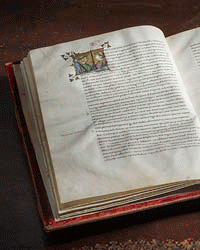Rare Book Monthly
New LetterLetters to the Editor
Unstated July 01, 2007
Respectfully submitted observations on young readers:
Dear Mr. McKinney and co.:
I'm an avid reader of the AE monthly and find its material well-researched and well-balanced, as well as timely. I did wish, however, to express a little concern about some remarks toward the end of this month's article about the Abebooks survey about young readers and booksellers. While I'm aware of the demographics reported by various institutions, I feel that it is important not to dismiss the younger generation as gadget-toting consumerists, or as a market sector for textbook sales. They are a generation much starved for attention and encouragement from their elders, and I can attest that such attention and encouragement quickly produces the readers and collectors desired, especially when the books offered are affordable.
Like most booksellers, I came to the business from another profession, but unlike most, I purchased my used book shop when I was 26. I set three goals for the business: to expand certain favourite sections (literature, poetry, philosophy, Irish history, etc.); to optimise online listings and to create a website; and to bring in as many younger customers as possible.
In the ensuing years, I have built up a strong community, including dozens of children under the age of 14 whom I know by name and tastes, and many of whom, with the encouragement of some wonderfully supportive parents and myself, have begun to read the Brontes and Austen, Kipling and Stevenson, Dickens, Twain, Richard Wright, Verne, and contemporary Nobel winners, too. One 13-year-old prodigy has even acquired a taste for Borges and Calvino. Far from being an endangered species, these voracious young readers needed no coercion and only a little pocket money and some unscheduled time to become acolytes of the literary canon.
Others, aged 17-22, with finances drained by ruthless textbook prices, with little free time due to the necessity of working 40-60 hours per week while attending college part or full time, came for some affordable escapism and have since formed both book clubs (they are head-over-heels for Jasper Fforde at the mo, especially the Shakespeare bits) and writing clubs, some producing truly promising fiction.
Are they collecting? The younger ones are, avidly, as much as their allowances permit. The college set collect good works in cheap editions, though they snatch up older Modern Library volumes with their holiday gift money. One is working on assembling a library of Hugo and Nebula winners in book club editions, assiduously purchasing plastic jacket sleeves to protect her investment. Another is taking lessons in binding and repair from the nearby Center for the Book so that, when he can afford a sadly disbound Dore Don Quixote I have tucked away, he will be able to mend it himself.
What marketing techniques have I used? None, save word of mouth. What promotions have I offered? None, save low prices on some old Grosset and Dunlaps or Signet mass markets. What has made this effort a success? Well, perhaps luck, and perhaps the benefit of my shop's location in a university town; definitely some goodwill built up by the shop's prior owners, and definitely the local availability of paperback classics; but I would submit that a principal element has been talk. Talk between readers, who are invited to share seating or to meet for board games or to play our piano and thus have ample chances to meet like minds, and talk between myself and the readers (and parents, where applicable) about what's good, what's critically acclaimed, what's based on something, what's like something else, what's relevant to modern life in expected or unexpected ways, and what offers a window to the past or future, or a concept of interest, or a bit of insight, or a sense that the reader is not alone, that there have been other people or at least other characters like the reader.
I've never had to ask them to turn off their cellphones. I've never had to wheedle them to try a new author. I've never felt that the few who have iPods or laptops value these things above books. I see only that they crave trust and interest, maybe a little offhanded mentorship, and a good story, which (yes) they know comes in little bound volumes rather than in boxes that bee-bee-bee-beep.
The chief trouble is that they don't know where to begin. They know names like Dumas and Tolstoy, but they want to hear which I liked best and why, and which I think they would like best given what they have enjoyed before. They want a little history and science, too, and they love a little gossip about the authors they've selected, or a little teaser ("There's a character in this book who reminds me of your friend So-and-so, but the comparison might not be obvious...."), or a few funny anecdotes about film adaptations failing to be as good as the original. They want the sense of community that can come with reading as much as they want the books themselves.
Really, all they need is a little free time, a little spending money, and a few well-placed recommendations. They like a little personal attention and a sense that they are recognised by the staff and welcome in the shop. They worry that they won't have time to read the treasures they've found, and that makes them worry about whether to spend the money, but they can't help feeling the desire to have the book at home so that they can savour it at leisure.
Rather, in fact, like the rest of us, don't you think?
Steve Goldman July 01, 2007
Dear Bruce:
I read your article this month re: the POWERSNIPE tool for Ebay. I have used it for about 7 years and have found it to be quite reliable. To your knowledge does POWERSNIPE have any advantages over ESNIPE?
Steve Goldman
Stephen A Goldman Historical Newspapers
Response:
Stephen:
Both services offer free trials. eSnipe charges a percentage [1% or thereabouts], Powersnipe a fixed fee of $59.95 or less. The easy math suggests if you are winning $6,000 a year of eBay lots Powersnipe is cheaper, if less than $6,000 eSnipe is a better deal. The key is to withhold bids until the final moment. How you do it is simply a matter of personal preference.
Bruce McKinney
Walter Aigner July 01, 2007
I've been a subscriber to Americana Exchange's premium services for half a year now. I do admit, I've been waiting for the newest issue of your articles every month - Eg. your evaluation of search engines, Google Booksearch etc.
This month's issue is a blunder. I'm afraid, this isn't good enough.
How can a bad article on the very basics of sniping at Ebay possibly make it to the final version? The only reason (but still unacceptable reason) is that this was a paid advertisement for the sniping service.
Unfortunately several other articles are re-warmed gossiping from earlier issues.
Undoubtedly you are facing the challenge of serving two very extreme populations: the ones who have shied from Ebay and Ecommerce and the heavy techies.
Maybe a third section - Articles, Reviews, and new: (3) "Gossip from inside the industry" and (4) "Techbasics for Newbies" could help overcome the frustrating experience of reading your articles without any relevant information.
As I'm neither shy nor a heavy techie but simply a collector from overseas who has done his homework (yes aged 45+ as is strangely mentioned on every occasion in your articles),
would you please consider serving the ones who have done homework too!!!!!!!!!!!!!!!!!!!!!
It goes without saying, that my feedback is most probably not directed to Bruce but to the staff responsible for your newsletter.
Walter Aigner,
yes 45+, PhD, BlaBlaBla, etc
Vienna, Austria
Mr. McKinney's response:
Mr. Aigner,
Thank you for your patience. Your high expectations are appreciated and we strive to meet them. We are, even as we serve the traditional collecting community, working to identify the next generation both to ensure continuity and a market for older collectors' material.
We try not to be too focused on the technical side of the trade but it is where innovation takes place. The world changes. We can neither deny the change nor protect those affected by it. We are doing our best to report it.
This month the article on San Quentin is, in my view, the most important. I spent 80 hours preparing it. It looks at material in the way the next generation does. If it seems unfamiliar it's because we are going through a sea-change in the approach to collecting. It is complicated.
Thank you
Bruce McKinney
AE
Editor's note: AE has no relationship with nor has ever received any advertising from PowerSnipe. The article represented the writer's personal opinion.
Anonymous July 01, 2007
Loved your article on sniping and eBay. But esnipe can be cheaper. FYI.
Chris Coover June 06, 2007
My compliments and thanks to Michael Stillman for his excellent review and overview of the Forbes sales.
I agree completely on the dimishing number of large, choice collections in our Americana field. Specialization seems to be the watchword of so many collectors these days, rather than comprehensiveness, which may have become too expensive! And many collectors seem to have a short "collecting life" unlike Malcolm (60 years or so) or Frank Streeter (40 years or more).
In any case, thanks, Michael.
Chris Coover
Christie's
dave lyons June 03, 2007
Hello Bruce,
I read with great sadness your article on the library closing in Oregon. I'm a retired librarian and know all too well the funding problems and the directors who cater to the electronic library. A lot of library problems can be attributed to ignorant city government officials--one councilman locally said some years ago, if people want to read, let'em buy a book. So much for enlightened rule.
The other aspect of your article that I think needs public attention is the "downsizing of government". If ever there was a mistaken notion, that is it. After I retired I had a chance to work in a Navy tech library for a year ON CONTRACT. This is where all the former goverment employees went--to contractors. Government has just shifted the faces and can say that they cut the bureacracy but it is larger than ever. My stint with the Navy cost the taxpayer at least 50% more than a government employee would have cost.
Thanks for your great newsletter. I would be poorer without it.
dave lyons
The Albatross
Anne Lange June 01, 2007
Letter addressed to Bruce McKinney re. exiting the bookselling business
About 20 or so years ago, you purchased some items from my one and only Western Americana catalog, sent out under my dealer name of Katonah Book Scout. Having retired last year after 25 years of
labor in the Book Boneyard, er, Vineyard, as a generalist, I found this issue of especial interest. It coincided with my own feelings about the present and future of the antiquarian field and the uncertainties of new directions.
One subject that you might care to examine more thoroughly is the difficulty of selling one's inventory
and when to start on such a project. A case in point: I decided in 2005 to move from Westchester to Florida and knew that I could only take about 2,500 of my 13,000 books to the southern climes. That started the juices flowing. With the aid of an organizer, it took me about a year to clear out 44 years' worth of living detritus from a family of six starting with the rafters of the attic and concluding with the garage, which on my side resembled a bookstore, having floor-to-ceiling shelving on three sides. By October the household was sufficiently clear of "stuff" to put it on the market. It was soon sold with a March, 2006 closing scheduled.
I had planned to sell much of my stock at half-price or less at the four antiq. shows I had signed up for. That Fall, New York is Book Country was cancelled forever. I did well at the other three shows but still had huge numbers of books to dispose of. Many boxes of books that had been stored at the back of the garage and unopened for several years, I discovered were mildewed; out they went into a big dumpster. Some books I had boxed but not noticed their suspect basement smell were rejected by my local library; more fodder for the big dumpster. Pretty soon I had a huge dumpster filled with books that it broke my heart to dispose of, but the movers were coming in March!
Then I called in some dealers and felt as I did when I had started twenty-five years ago, i.e. at their mercy. My own collection in the house I culled through about four or five times, donated much of it to the library and boxed about 55 cartons for shipment south. The books were warehoused for a few months while I had bookshelves built for them. Now whenever anyone comes into my house, they are amazed at all the books I have. In the adult communities down here, the decor is immaculate: nothing out of place, the dining room table perpetually set for the perfect dinner party (which is pretty ironic, since many people don't cook much any more.) I turned my dining room into a library with a big easy chair & reading lamp and a library table
with ephemera and books displayed. I guess once the bookseller, always the bookseller.
The point of all this: without a storefront, one must start selling off one's stock years before one retires. For my specialty, Black Americana, I was told that the auction market was a bit slow and to hang onto the highlights of my stock. I called Alibris and wanted to send a lot of my stock to them, but was informed they were no longer accepting large holdings for consignment. The dealers I called in all wanted to cherry-pick, to which I eventually acquiesced.
After reading this issue of AE, I see I was wise to retire last year as the book shows and a few catalogues were my primary sources of income. I might try the ebay route for some of my better material and ephemera.
The video of the Gold Rush show was both nice and disheartening. I can look back at it during these retirement years with nostalgia but the dearth of collectors or customers reminds me of all those dreary Sundays
where we would have nobody to talk to but ourselves and one can take only so much bookseller bulls..t,
n'est-ce-pas?
I feel confident that the tide will turn again but when and in what direction is anyone's guess. The New Age
and Sci-Fi trend is certainly robust and History is making a lovely comeback. Therein may lie the solution.
Anne Lange, nee Katonah Book Scout
Kol Shaver June 01, 2007
Dear Bruce,
It is incredibly saddening to see the closing of libraries in economically disadvantaged counties of Southern Oregon. Fascinating that a whole swath of a Pacific Northwest state has chosen to eviscerate its future because it believed that the Federal Government wouldn't really hang them out to dry.
Of course this is the same state that continually funds its higher education below much poorer states such as Mississippi, and sees no reason for funding a State Police force at less than half of the level they maintained 20 years ago.
Still, they are destroying their future, and that of their children. Maybe they'll wake up, but I doubt it.
Best regards,
Kol Shaver
Anonymous June 01, 2007
re: Roberts' article on UPS
I'm reading this article with great confusion. UPS is United Parcel Service. USPS is United States Postal Service. Either the two are somehow mixed up in the article or the USPS is being referred to as UPS. I'm wondering why an editor didn't catch this. Other than that, it appears to be an excellent article.
Anonymous
Editor's Response
This is a bit confusing and counterintuitive, but what happens is that UPS picks up packages at your location and delivers them to the post office for you. How does this save you money? UPS takes your package to a post office closer to your ultimate shipping address, but charges you less that the post office charges to take it that far. As an illustration, if the post office charges $1 to ship a package within state A, and $3 to ship it from state B to state A, UPS would pick up your package in state B and charge you $1 to ship it to a post office in state A for delivery to your customer. In both cases, the package is ultimately delivered by the post office, but in the first example, you pay $3, but by having UPS carry it part of the way as in the second example, you pay $2. These numbers aren't actual cases, but this is the principle.
Nan Albinski May 05, 2007
Thank you so much for the article about Susan Heller. Though our backgrounds differ, and I'm just a "johnny-come-lately" on the book scene, her current situation is mine. I have specialised in children's books, and trading online only, I have only 4,000 that must go before I retire to my village. Everything is waiting on dispersal of the books.
I haven't moved quickly on them ; I'm off to a book fair shortly, where perhaps I'll find a possible buyer. I think they would fit splendidly into a large bookshop, where they would make an excellent children's section. I think one asset of my books is that they are all listed on a database.
I began business in the US ; then returned home, first to Sydney, then Melbourne. We've seen good days and bad together.
Hoping to have found a solution by June 30 (end of the financial year).
All the best,
Nan Albinski
Clare Van Norman May 04, 2007
Dear Bruce,
Thank you very much for your extraordinary coverage, including your filming of the Frank Streeter Sale! It was an especial pleasure for me since I attended at least one part of the sale of Thos. W. Streeter's auction years ago.
With best wishes,
Clare Van Norman
Lee Kirk May 04, 2007
Hi, Bruce -
Thanks for another highly interesting newsletter. Your report on the F.
Streeter auction was beautifully written, and the video was a delight. Not
having been in Christie's auction room since the advent of internet bidding,
I found the addition rather startling. But then, the book biz is rather
startling all around these days.
I won't say that the trade is steeped in despair as yet, but a lot of the
hopefulness is waning. Change is inevitable I guess - good or bad doesn't
matter (and the point of view does when making judgments) - it's still
change.
I think I appreciate your very skillful writing as much as the news and
perceptions that you convey.
My compliments again,
Lee
Donald Hawthorne May 03, 2007
re: Post Offices Changes
Thanks for your comments in Americana Exchange. I think, after 53
years of selling books by mail, that this is a revolutionary point in
the changing of our postal system, no longer an evolutionary one. From
the founding of the postal system until very few years ago, it was
believed with the authors of the Federalist Papers, that an informed
electorate required special treatment in the dissemination of knowledge.
No more. In fact, an informed electorate in today's climate, would be
considered a threat to our leadership.
Donald Hawthorne
Noah's Ark Book Attic
David May 02, 2007
Comment re: Post Office Article
Hello,
There were a couple major errors in this story.
Media Mail will continue, at an increased price, but
it will continue.
Air M-Bags will also continue, at an increased price
and with no Surface M-Bag service, but Air M-Bag will
continue.
Both according to the USPS website:
http://www.usps.com/ratecase/welcome.htm
Thanks!
David
Graham Richards May 01, 2007
I enjoyed reading the account of the Frank Streeter auction - one reason for high bidding from the UK of course is surely the weak dollar. A couple of years back the rate was oscillating around $1.60, now it's as good as $2. However, as around 25% of my abebooks sales are to the States, I am not very happy about this!
Best wishes,
Graham Richards
. May 01, 2007
Michael Stillman quite rightly criticises the use of management bollockspeak in his piece on Froogle, but then goes on to say "So far, Google has leveraged its search engine to support advertising."
I'm afraid that I speak only English, and this use of 'leveraged', which appears again further down in the article [and everywhere, in all the financial newspapers] conveys absolutely nothing whatsoever to me.
Keep up the good work.
Chris Baron
Writer's Response: You are absolutely right. I, too, have been reading too many financial newspapers. "Leverage" is a noun, not a verb, despite my attempts to change its nature.
Martin Breese May 01, 2007
Dear Mr. McKinney,
What an excellent email report boosted by video and so informative. My interest is really modern first editions but I am sure that as I click here and there I will be learning more and more. Keep up the good work.
I run a very different kind of business (selling new and old conjuring-related items to performers all over the world) and I shall take a leaf from your book (no pun intended) by adding video clips in amongst my text..
Excellent.
Inspiring and so well done.
Kind regards,
Martin Breese,
Brighton, UK
John Pinkney April 04, 2007
Dear Mr McKinney,
I always enjoy the AE monthly newsletter and I do hope that it reaches a wide audience. Subject matter seem to most always be interesting and relevant to the book field at all levels.
This month's write up on the SF Anarchist (?) Fair and the future and relevancy of libraries was especially thought provoking. The video was excellent and I am positive there's a 60 minute documentary in there somewhere, which I leave to you and PBS (or A&E, et al to work out the details). The point is that I'm encouraging more of this. (Yes, I know you've done other videos, which I have enjoyed much. Keep that up!!) Okay, so the perspective of that particular pool of interviewees was skewed, but they always are in one direction or another. Nevertheless, it's important for these voices to be heard and it's instructive for the book world to hear them.
That's it. Just a big thanks and I, for one, would enjoy more of it!
- John Pinkney
Editor's Note: This article may be seen at the following link: Click here.
Anonymous April 02, 2007
Fascinated by article on Memories. Man's ability to record and recall must be one of the factors differentiating him from amoeba. However the ability to use technology is great but the ability to recall is being prejudiced. For instance how many have data stored on CPM data disks and have no means to read them. Even NASA cannot replay many records from the moon shots because of the storage media deterioration and or loss of machines that can read the data. Clay tablets and hard copy print has survived because the media is preservable and man can read. The problems of sorting are soluble - readability and media preservation can be solved if it is tackled now.
On a related topic. Looking at some current computer games and simulators I am struck by their realism but how will future generations differentiate between the truth and simulation?
Thats enough philosophizing for first thing Monday morning.
I enjoy your newsletter.
Ed Markiewicz April 02, 2007
I very much appreciate your Monthly Newsletter. It is enlightening, the right mix of book, collector and American specific articles.
I haven't bought anything from you...but I keep looking for the right item for my collection.
Great job!
Ed Markiewicz
Editor's note: AE doesn't sell books. We post listings from booksellers in "Books For Sale," and from auctions in the auction search. However, these are all independent sellers and AE is not involved in nor receives commissions from any sale.
Robert Johnson April 01, 2007
re: Memory, the next frontier
Dear Bruce,
It is indeed wonderful that average people can save all kinds of easily accessible information. I concur that the advent of the computer and electronic data storage is as significant as Gutenberg's momentous invention.
But beware: CD's begin to deteriorate in two years. Within 5 years nearly all have some loss of data. (Check this out. I cannot recall exactly where I saw this authoritatively printed.) A direct hit by an airplane, truck, lightning bolt, saboteur, tsunami, or ???? could wipe out trillions of bits of important data on a server. Remote back-ups are vital. Urge everyone to store their valuable data in at least two quite different places. Many server sites do this already. But we should have a routine for assuring ourselves about it.
Love your articles.
Bob Johnson
Robert Johnson
A-J Books
Bookphil April 01, 2007
re:Libraries on the Brink: A topic at the Anarchist Book Fair
Tell anyone who reads, the AE is THE source of information monthly.
Chuck Whiting March 05, 2007
Dear Bruce,
I read your recent article on Americana Exchange about the set of Bigelow's Botany you bought in New Paltz from an auction of Esther Bensley's possessions. I read that with great interest because I'm the bookseller from whom you bought, via Ebay last month, an old photograph of a graduating class in or around New Paltz. The town name and a photographer name were the only identifiers I could find on the photo's matting. I dated the photo about turn-of-the-century, based on period clothing. And I wondered about the young people in the photo, who they were, and what became of them. For as long as I had it, I thought it an interesting photo.
After reading your article, and learning of your history and knowledge of New Paltz, I'm hoping you can help unravel some of the mystery about the photo. Could Miss Bensley have possible been one of the young students in the photo? Or could she have been their teacher? Any information you could share would be appreciated, just for curiosity's sake.
Thanks for writing that article - I enjoyed it.
Best regards,
Chuck Whiting
Whiting Books
Matthew C. DeLoach February 02, 2007
Hello Bruce.
You may not remember me, but we met about 6 months ago at The Seattle Book Fair. My name is Matthew Casey DeLoach. I am the 27 year old young collector and dealer of rare books that you interviewed on the subject of what interests me as a young collector. I enjoyed your recent article and dealer interviews on the same subject. With the increase of amateur sellers on line, one too many online buyers have been burnt by faulty descriptions, inaccurate edition information, and fake signatures. Hence, the new generation of collectors being trigger shy when it comes to dropping big money on line.
It is very next to impossible to stop the wave of change in the collecting market. New collectors are going to continue to buy online and the best a traditional shop keeper can do is learn to master the online method of selling the same way they became masters in the old days. I agree, online shopping can never compare to the experience of treasure hunting in a traditional book shop, nor can one gain the knowledge that talking to long time sellers can provide. This is very sad, but it is an age of convenience. It is much easier to click a mouse from your computer than it is to search the shelves of local bookstores (not to mention the selection is infinitely more extensive). I am very confident that online selling will not hurt the trade, rather, elevate it to a whole new level. We are encountering the same problem with the internet that Gutenberg's Press encountered. Were not the scribes at the time fearful of almost the same thing we're fearful of now? But look at what that invention did for bookselling. The internet should be used as a tool for progress, not as a virus that will eventually kill the industry.
The old expression "If you can't beat 'em, join 'em" comes to mind. The return of the true professional is what the online market needs to reclaim it's glory days of $25,000 book deals. Let the old sellers go online and pave the way for the new generation so the new collector can once again learn to buy with confidence. After all, the net is an unlimited source of information and should not decrease book knowledge, but rather increase it.
With Warm regards,
Matthew C. DeLoach
Editor's Note: The article to which Mr. DeLoach refers, "Where is the new book collector," may be found at this link: Click here.
Richard Davies February 01, 2007
Dear Michael,
I read Americana Exchange with great interest this morning. Lots of good stuff in there.
With regard to our top 10s, thanks for featuring them...
There seems to be a ceiling as to how much someone will pay for a rare book on AbeBooks. $65,000 is the top price ever. We generate plenty of sales over $1000 on a daily basis. Sales in five-figures are much rarer.
There is, of course, a limit to how much someone will pay on the internet for a book they haven't seen or handled. They may have seen bookseller-provided images but they'd still rather see the book in the flesh if they are considering paying such a substantial sum.
And that's fine - we accept that. We also know that the high-end booksellers list books priced at $100,000 and much, much higher on the site. They know that they're not going to sell them through AbeBooks but it tells collectors out there that they have them. We suspect those high-end listings drive buyers into their showrooms and bookstores. I hope that is the case. We like to think we sometimes play a small role in some major rare book transactions simply because AbeBooks has been used as an advertising medium rather than ecommerce platform.
Anyway, it was a good read this morning.
Several things going on at AbeBooks.com
We have just launched 2 new rooms - one for Science Fiction and one for Fantasy. There's an interview with Barry Levin.
http://www.abebooks.com/docs/ScienceFiction/
http://www.abebooks.com/docs/Fantasy/
They are aimed at collectors, hardcore sci-fi/Fantasy fans and people with a passing interest in the genres. We get all sorts coming to the site so we're trying to provide something for everyone.
Also we've been previewing the California Book Fair for some time now - http://www.abebooks.com/docs/RareBooks/California-2007.shtml
And we've taken a look at collecting movie scripts - http://www.abebooks.com/docs/RareBooks/movie-scripts.shtml
Regards
Richard
Richard Davies
PR & Publicity Manager
Editor's Note: The article referred to in this letter may be found at the following link - Abebooks' Top 10

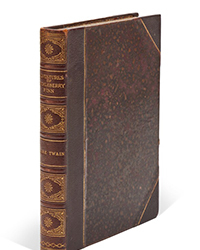
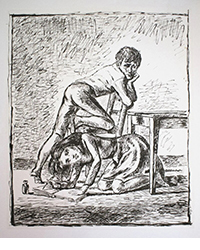
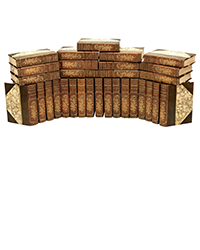
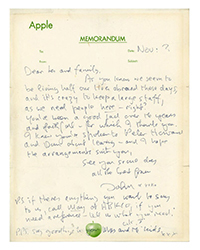
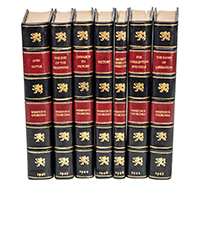
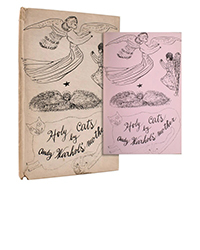
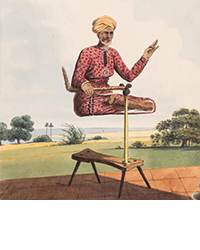

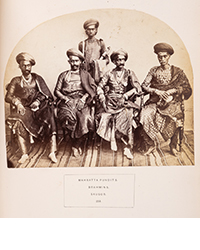
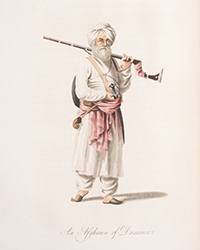
![Forum, Feb. 19: Lot 57[Album and Treatise on Hinduism], manuscript treatise on Hinduism in French, 31 watercolours of Hindu deities, Pondicherry, 1865. £3,000-4,000 Forum, Feb. 19: Lot 57[Album and Treatise on Hinduism], manuscript treatise on Hinduism in French, 31 watercolours of Hindu deities, Pondicherry, 1865. £3,000-4,000](https://ae-files.s3.amazonaws.com/AdvertisementPhotos/f70b3790-9b4a-4990-b402-f0322021c0de.jpg)
![Forum, Feb. 19: Lot 62 Allan (Capt. Alexander). Views in the Mysore Country,
[1794]. £2,000-3,000 Forum, Feb. 19: Lot 62 Allan (Capt. Alexander). Views in the Mysore Country,
[1794]. £2,000-3,000](https://ae-files.s3.amazonaws.com/AdvertisementPhotos/ad2cf7b4-4d93-4231-a956-b440583b39b3.jpg)
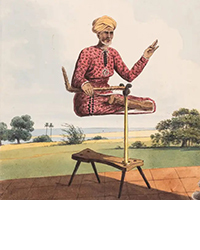
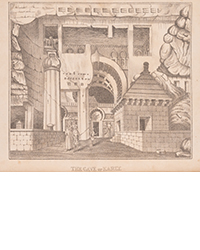
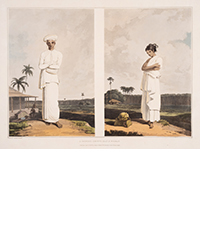
![Forum, Feb. 19: Lot 123D'Oyly (Charles). Behar Amateur Lithographic Scrap Book, lithographed throughout with title and 55 plates mounted on 43 paper leaves, [Patna], [1828]. £3,000-5,000 Forum, Feb. 19: Lot 123D'Oyly (Charles). Behar Amateur Lithographic Scrap Book, lithographed throughout with title and 55 plates mounted on 43 paper leaves, [Patna], [1828]. £3,000-5,000](https://ae-files.s3.amazonaws.com/AdvertisementPhotos/5651043b-3c0d-4e2c-931f-72133bda9b36.jpg)
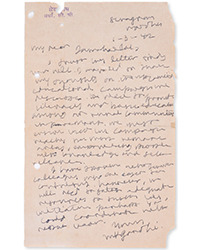
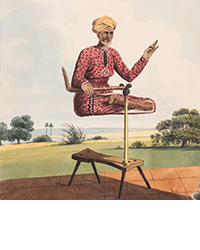
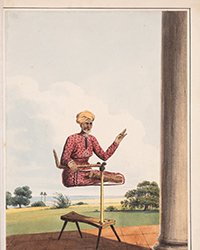
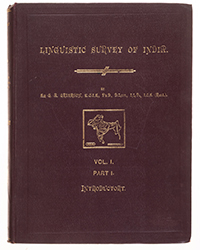
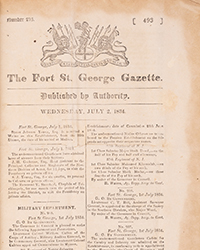
![Forum, Feb. 19: Lot 205Marshall (Sir John) and Alfred Foucher. The Monuments of Sanchi, 3 vol., first edition, 141 plates, most photogravure, [Calcutta], [1940]. £3,000-4,000 Forum, Feb. 19: Lot 205Marshall (Sir John) and Alfred Foucher. The Monuments of Sanchi, 3 vol., first edition, 141 plates, most photogravure, [Calcutta], [1940]. £3,000-4,000](https://ae-files.s3.amazonaws.com/AdvertisementPhotos/8c8244b7-4573-44d3-9c70-e0d3a3ed3cc4.jpg)
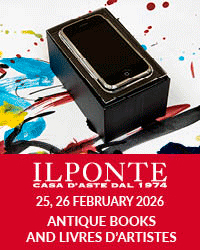
![Il Ponte, Feb. 25-26: HAMILTON, Sir William (1730-1803) - Campi Phlegraei. Napoli: [Pietro Fabris], 1776, 1779. € 30.000 - 50.000 Il Ponte, Feb. 25-26: HAMILTON, Sir William (1730-1803) - Campi Phlegraei. Napoli: [Pietro Fabris], 1776, 1779. € 30.000 - 50.000](https://ae-files.s3.amazonaws.com/AdvertisementPhotos/0372eeb9-97e1-47b2-baca-b3287d4704ee.jpg)
![Il Ponte, Feb. 25-26: [MORTIER] - BLAEU, Joannes (1596-1673) - Het Nieuw Stede Boek van Italie. Amsterdam: Pieter Mortier, 1704-1705. € 15.000 - 25.000 Il Ponte, Feb. 25-26: [MORTIER] - BLAEU, Joannes (1596-1673) - Het Nieuw Stede Boek van Italie. Amsterdam: Pieter Mortier, 1704-1705. € 15.000 - 25.000](https://ae-files.s3.amazonaws.com/AdvertisementPhotos/8f9ce440-b420-4407-8293-eb8e1b38ca19.jpg)
![Il Ponte, Feb. 25-26: TULLIO D'ALBISOLA (1899-1971) - Bruno MUNARI (1907-1998) - L'Anguria lirica (lungo poema passionale). Roma e Savona: Edizioni Futuriste di Poesia, senza data [ma 1933?]. € 20.000 - 30.000 Il Ponte, Feb. 25-26: TULLIO D'ALBISOLA (1899-1971) - Bruno MUNARI (1907-1998) - L'Anguria lirica (lungo poema passionale). Roma e Savona: Edizioni Futuriste di Poesia, senza data [ma 1933?]. € 20.000 - 30.000](https://ae-files.s3.amazonaws.com/AdvertisementPhotos/71bb9667-5d66-4aa8-96a2-9880c74a7a26.jpg)
